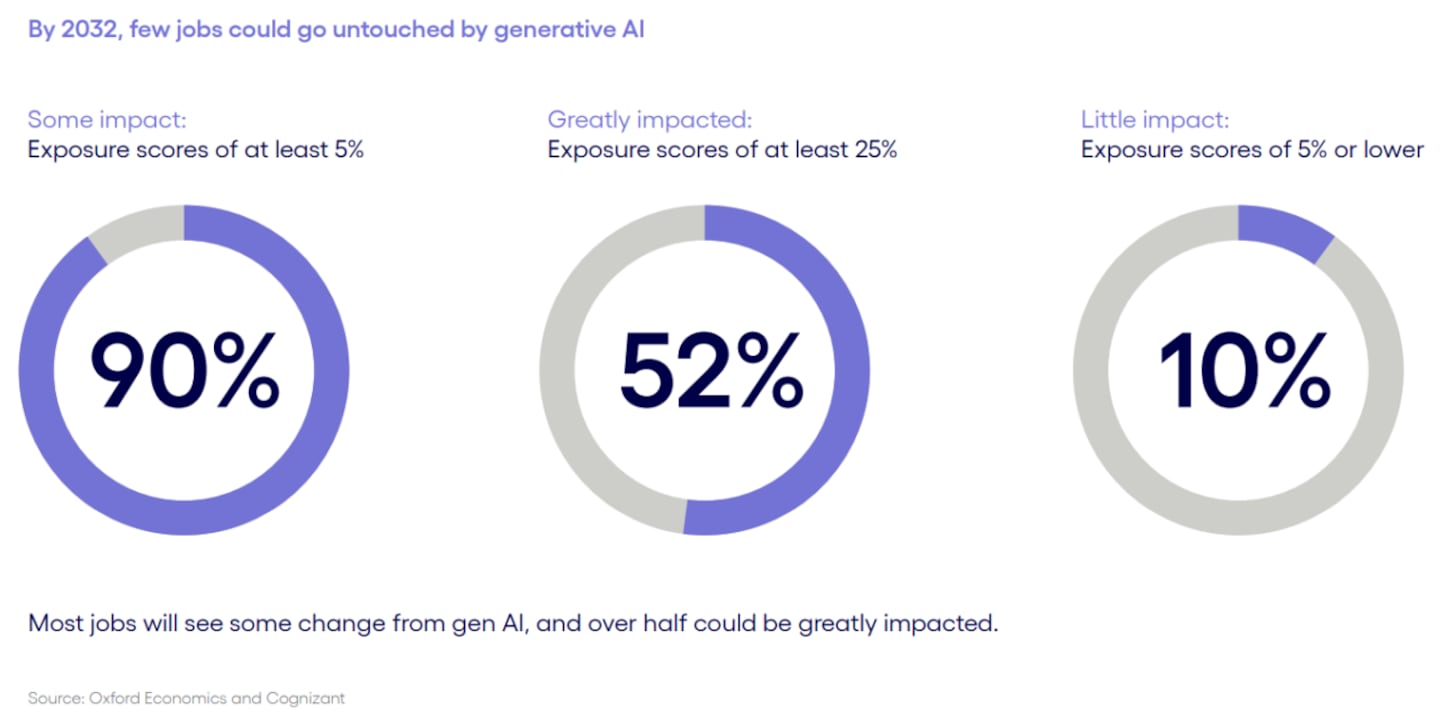This summer, a wave of new graduates are embarking on finding their first jobs and entering the workforce. Amidst a competitive job landscape, it's also an exciting time that's marked by a flurry of hallmark learnings like navigating a new professional network and making a positive impression with colleagues.
These young professionals are also grappling with an increasingly daunting consideration: How might generative AI affect their roles over the coming years?
While there are many headlines about Gen AI, there is good news and new opportunities for employees and prospective candidates amidst the AI revolution. Research from Cognizant and Oxford Economics suggests generative AI can make human skillsets more valuable. The forecast was based on a U.S. Department of Labor database containing detailed information on the skills and requirements for approximately 1,000 occupations—a database that now spans more than 20 years.
Graduates have a terrific moment to use this as a springboard to expand their capabilities, try new roles and become more versatile. In short, everyone must embrace the mindset of becoming a learning athlete.
Cognizant
Everyone is in charge of their own learning journey
While there's a lot of focus on entry-level jobs, most jobs will feel the impact of AI—everyone from administrative assistants to CEOs will be affected. Cognizant and Oxford Economics research found generative AI could disrupt most jobs (90%) in some way over the next 10 years.
We're at a turning point for professional growth—one that's starting to lean more heavily on skills in addition to gaining experience and network connections. In the coming years, traditional hierarchies will decrease in importance as skills—not seniority levels—determine an individual's value on a team and career opportunities.
To keep pace, AI is forcing us to think about learning in a different way. We're moving from a "structured" learning environment to an "unstructured" one. Learning is no longer an experience we reserve only for academic institutions, under the guidance of professors and syllabi. We're all in charge of our own learning journeys now.
College graduates have a significant advantage in this evolving workplace. Why? Because they're already learning athletes after spending 20 years of structured education building this muscle.
The biggest challenge, though, is transitioning from a structured learning environment to a continuous and self-motivated one. Grads may feel like they've reached their educational finish line, but they're actually entering a new chapter of learning.
As new grads look for jobs, if they prioritize prospective employers that focus on skilling, they will come out ahead. Strong employers will help grads make this transition by providing tailored learning paths and guidance.
At the same time, the world is facing a crisis of confidence as it relates to leaders and Gen AI. According to Udemy, nearly half of professionals are not confident their leaders have the skills needed to lead them through the Gen AI transformation.
Many leaders may not realize they need to upskill, and fast—instead banking on their years of experience to carry them through change. It's time to reframe that thinking and prioritize knowledge building, no matter your role or rank.
The bottom line is professionals need to take ownership of what and when they learn, and they need to maintain continued rigor for learning amidst daily tasks.
How to become a learning athlete
To lay the groundwork for a successful career path, here are a few habits to form:
- Be your own entrepreneur of learning. Keep training. Take ownership and make learning a daily habit. Setting aside dedicated time in your day, trying the most cutting-edge training methods, challenging your body (or in this case your mind) with new techniques.
- Choose an employer with a robust learning and development ecosystem. Both for recent grads and more experienced professionals, focus less on what job you're going to do and more on what you're going to learn with your new employer. So much is changing—join an organization that will help you stay ready for what's next and future-proof your career.
- Be open to trying new things. Learning isn't always planned—in fact, it happens best when you're uncomfortable, push your boundaries, and even when you make mistakes. Focus on gathering a variety of experiences, not just becoming an expert at a certain skillset or moving up the ladder. Taking a broad, longer-term view will lead to a higher trajectory over time.
Technology is evolving, but humans are too. When we embrace continuous learning, the future with Gen AI looks brighter. Some of the best innovation will come from humans because of this technology, and new and different career paths will emerge—and that's good news for us all.
This story was produced by Cognizant and reviewed and distributed by Stacker.








